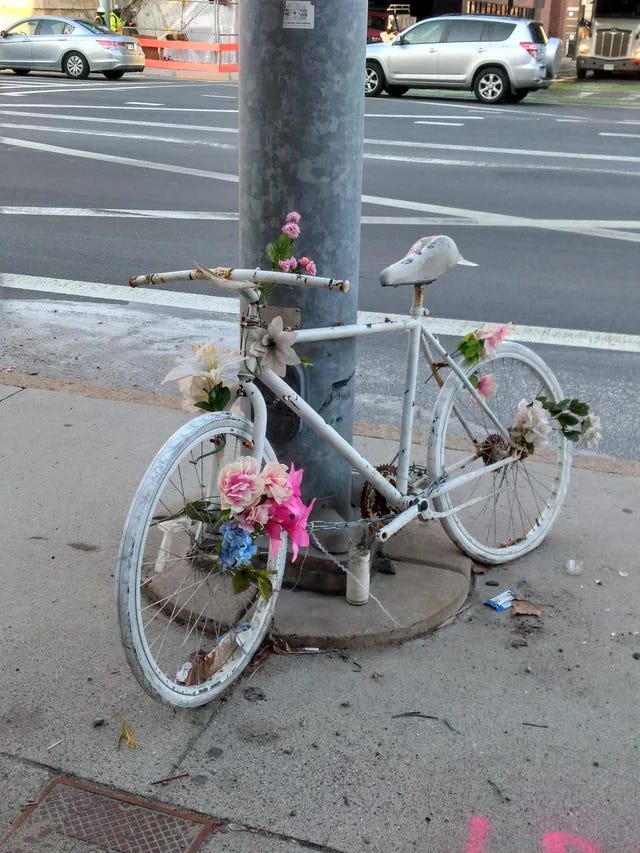the white bike on 38th
For the man whose name I never learned.
There’s something no one tells you about working at 911: it makes you a quiet witness to every kind of heartbreak imaginable. You become a disembodied voice at the end of the line, holding people in their worst moments with nothing but words and instinct. Most days, I can compartmentalize it. I file the trauma away neatly in my body, in places I think I won’t have to touch.
But the thing is, it doesn’t stay put. It finds its way into everything—into my sleep, into my silences, into the way I carry myself through the world. And eventually, it started showing up in my writing. I didn’t know how to process what I’d heard, what I’d felt, so I started writing these moments into my poems. Not because I wanted to, but because I had to. Because some things are too heavy to carry in silence, and too intimate to share in any other form.
Poetry became the only language that made sense for what was happening inside me.
Some calls stay with you more than others. Some carve their names into your memory even when you never learn theirs.
This one happened the night before my birthday. A man was hit by a car on 38th Ave in west Denver. I never saw his face. I never touched his body. But I was there, in the only way I could be. I heard the woman who knelt beside him. I gave her the words to try and save him. And I listened as they didn’t work.
That woman was my pharmacist.
That man was my neighbor.
This is the poem I wrote for him.
the white bike on 38th
for the man whose name i never learned
Her voice cracked like glass on the line, panic spilling through the receiver, and I sat there, steady— a stranger’s calm in the chaos of her world. The words came out like muscle memory, sharp and clinical, rehearsed to precision, but God, did they feel hollow. "Mouth to mouth," I said, like it was easy. Like it wasn’t a man’s fragile grip on existence we were wrestling with. She was a pharmacist. Her voice, trained for precision, now trembling, brittle, breaking under the weight of my instructions. "Pinch his nose. Tilt his head. Seal your mouth over his. Blow." And I heard her do it. I heard her sob between breaths, heard her body breaking with the effort to bring him back, to undo the violence of steel on flesh, the cruelty of time ticking away. I wasn’t there, but I could see it. Blood, asphalt, headlights like hollow eyes, and him, sprawled, broken like a discarded doll. I could see her kneeling, the pavement biting into her knees, as she gave everything she had to a man she didn’t know. And me, miles away, tethered to this scene by the fucking headset and my own voice, unable to reach him, unable to reach her. The seconds dragged, each one a weight pressing on my chest, and I could feel the futility creeping in. "Keep going," I said. "Keep going." And she did, her gasps blurring with mine, her desperation bleeding through the line like a wound that wouldn’t clot. It wasn’t enough. It’s never fucking enough. I drove past that intersection for months, my eyes drawn to the white bicycle tied to the light pole where it happened, a silent memorial to the man whose name I never learned. I hated that bike. I hated how it stood there, a quiet accusation against the universe, against me, against all the breaths I told her to give that couldn’t bring him back.
…
I live in that neighborhood. I saw the posts on Nextdoor. His family begging the public for answers. Asking for witnesses. Sharing pictures. Sharing grief. I know people loved him. That was never a question. The question was what to do with my part of the story—this hidden, silent role I played in the worst night of their lives.
I toiled within myself, wondering if I should say something. Should I tell them I was the voice on the other end of the line? That I stayed with him, with her, as best I could? That I was the one who told her what to do when she didn’t know what else there was to try?
But I never did. I still haven’t.
There’s no protocol for this. No manual on what to do when the anonymous pain you hold in your headset spills out into your real life. When the woman who comes in to fill your prescriptions is the same one whose voice broke in your ear as she tried to save a stranger’s life. When the man on the pavement becomes more than just a case number—when he becomes your neighbor.
They’ll never know it was me. They’ll never know I listened to him die. That I gave the instructions. That I whispered, “You’re doing everything right,” even when I knew the odds were impossibly small. They’ll never know how I sat in my car after the shift ended, staring at nothing, unable to start the engine, because I felt like I had just lived a death I couldn’t explain.
That’s why I write these poems.
Not for closure. There’s no such thing here.
Not for beauty. Death isn’t beautiful.
But because this is the only way I know to carry what I’ve witnessed.
Because the headset comes off, but the echoes don’t.
Because sometimes, when I can’t speak the truth out loud,
I can still carve it into a page.
And maybe that’s a kind of prayer.
Maybe that’s a kind of witness, too.



